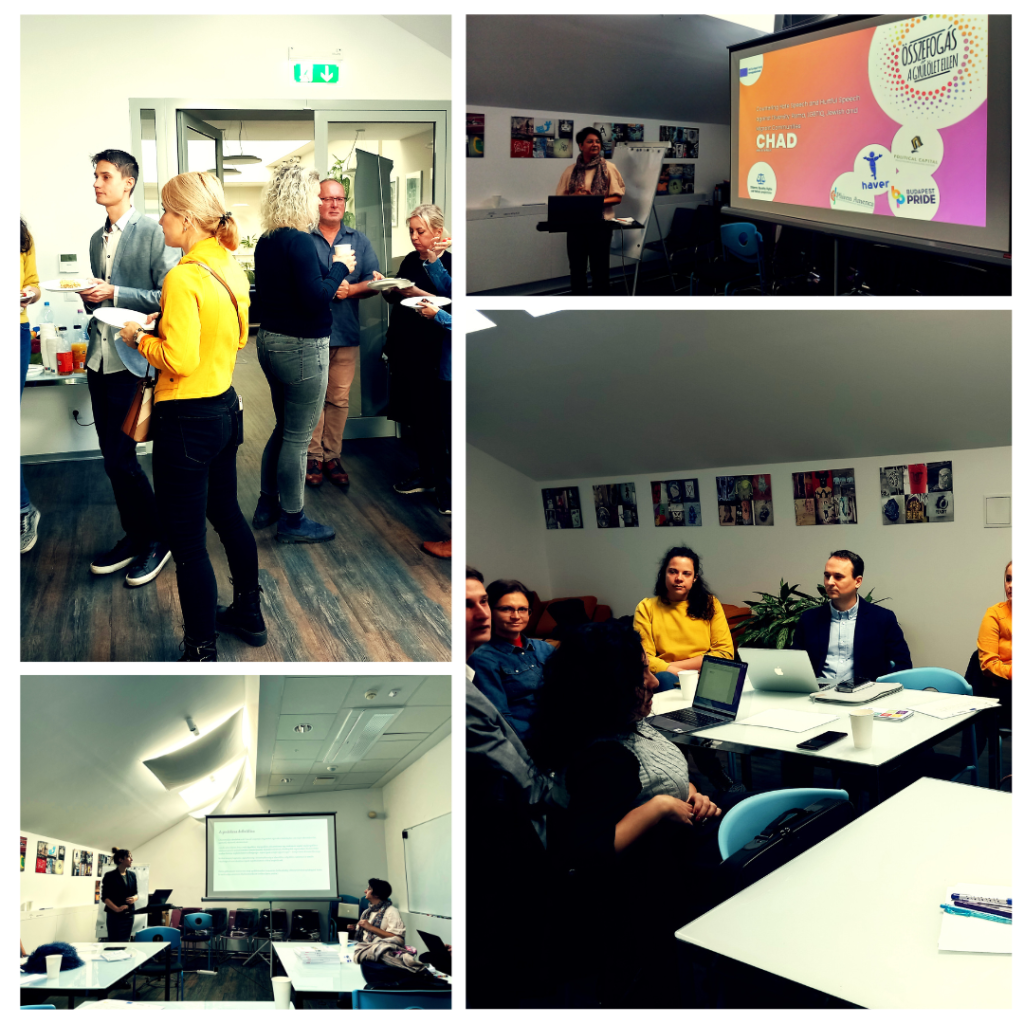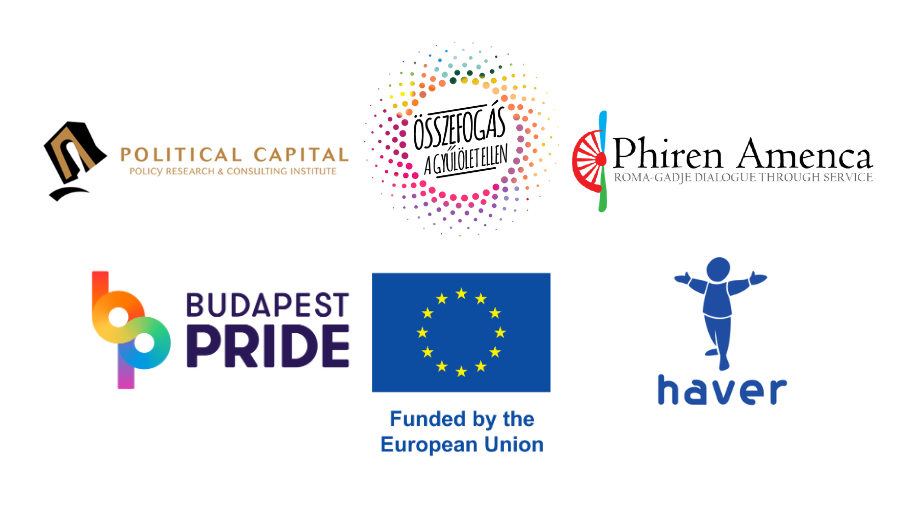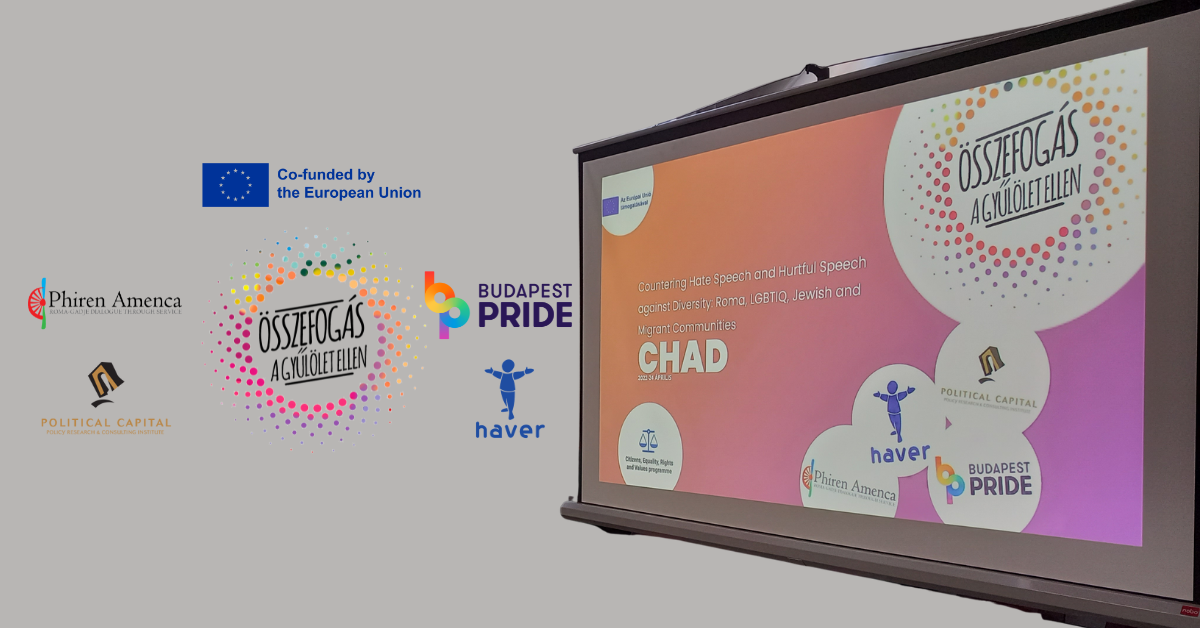(Görgess le a magyar nyelvű összefoglalóhoz)
It is a shared experience for all of us that the discourse about minorities is one of the most turbulent arenas in the political scene. This becomes even more apparent as political campaign periods approach. In our project supported by the European Union, we focus on key actors who can actively combat hate speech (representatives of civil organizations, media workers, and decision-makers): we train them, make recommendations to them, and perhaps most importantly, connect relevant actors to each other for more effective action.
On the 8th of November, 2023, we held a training workshop for local-level decision-makers, and public officials in order to equip them with toold they can prevent and combat hate speech and exclusionary narratives. During the one-day program, decision-makers engaged in discussions regarding the relationship between hate speech and politics, as well as strategies for more effectively representing vulnerable groups and combatting hate speech related to their issues. In the first part of the workshop, participants conversed about the definition of hate speech and the dilemmas associated with it.
In the first phase, the workshop facilitated an exchange of experiences among attendees, fostering a moderated discussion where invited decision-makers shared their insights and strategies for combating hate speech in their respective territories. This session provided a valuable opportunity for participants to glean insights from each other’s experiences and perspectives.
After the lunch break, attention turned towards exploring counter- and alternative narratives as potent tools in combating hate speech. Participants were introduced to these concepts and presented with international best practices, particularly those implemented by various municipalities worldwide.
In the nex session, proposals formulated by civil organizations were presented to the invited decision-makers. The proposals stemmed from data collected through questionnaires distributed to various NGOs beforehand, inquiring about the support they would require from decision-makers to fulfill their missions effectively. At the session’s conclusion, contacts of NGOs willing to share their information with decision-makers were provided, with a commitment to facilitating future connections. Through collaborative dialogue, attendees explored these proposals, delineating potential avenues for further cooperation and collective action.

KAMPÁNYOK ÉS KISEBBSÉGEK – Mit tehetünk döntéshozóként a gyűlöletbeszéd ellen?
Mindannyiunk közös tapasztalata, hogy a kisebbségekről folytatott vita a politikai színtér egyik legzavarosabb színtere. Ez a politikai kampányidőszakok közeledtével még nyilvánvalóbbá válik. A CHAD projektben olyan kulcsfontosságú szereplőkre összpontosítunk, akik aktívan felléphetnek a gyűlöletbeszéd ellen (civil szervezetek képviselői, médiamunkások és döntéshozók): képezzük őket, ajánlásokat teszünk nekik, és ami talán a legfontosabb, összekötjük az érintett szereplőket egymással a hatékonyabb fellépés érdekében.
November 8-án képzési műhelyt tartottunk helyi szintű döntéshozók és köztisztviselők számára, hogy felkészítsük őket arra, hogyan tudják megelőzni és leküzdeni a gyűlöletbeszédet és a kirekesztő narratívákat. Az egynapos program során a döntéshozók megbeszéléseket folytattak a gyűlöletbeszéd és a politika kapcsolatáról, valamint a kiszolgáltatott csoportok hatékonyabb képviseletére és az ügyeikkel kapcsolatos gyűlöletbeszéd elleni küzdelemre vonatkozó stratégiákról. A workshop első részében a résztvevők a gyűlöletbeszéd definíciójáról és a vele kapcsolatos dilemmákról beszélgettek.
Az első szakaszban a résztvevők közötti tapasztalatcserét elősegítendő, moderált vita vette kezdetét, ahol a meghívott döntéshozók megosztották egymással a saját területükön a gyűlöletbeszéd elleni küzdelemmel kapcsolatos meglátásaikat és stratégiáikat. Ez az ülés értékes lehetőséget biztosított a résztvevők számára, hogy egymás tapasztalataiból és nézőpontjaiból tanulhassanak.
Az ebédszünet után a figyelem az ellen- és alternatív narratívák, mint a gyűlöletbeszéd elleni küzdelem hatékony eszközeinek feltárása felé fordult. A résztvevők megismerkedtek ezekkel a fogalmakkal, és bemutatták a nemzetközi legjobb gyakorlatokat, különösen azokat, amelyeket a világ különböző települései hajtottak végre.
Végül a civil szervezetek által megfogalmazott javaslatokat mutattak be a meghívott döntéshozóknak. A javaslatok a különböző civil szervezeteknek előzetesen kiosztott kérdőívekből gyűjtött adatokból származnak, amelyekben arról érdeklődtek, hogy milyen támogatásra lenne szükségük a döntéshozóktól ahhoz, hogy hatékonyan teljesíthessék küldetésüket. Az ülés zárásaként a döntéshozókkal megosztani kívánt civil szervezetek elérhetőségeit adták meg, és kötelezettséget vállaltak a jövőbeli kapcsolatok megkönnyítésére. A résztvevők közös párbeszéd során megvizsgálták ezeket a javaslatokat, és felvázolták a további együttműködés és a közös fellépés lehetséges útjait.

The „CHAD – Countering Hate Speech and Hurtful Speech against Diversity: Roma, LGBTIQ, Jewish and Migrant Communities” project (project nr. 101049309) is funded by the Citizens, Equality, Rights and Values Programme (CERV) of the DG Justice, European Commission and coordinated by RGDTS Nonprofit Llc. in partnership with Haver Informal Educational Foundation, Rainbow Mission Foundation and Political Capital. Views and opinions expressed are however those of the author(s) only and do not necessarily reflect those of the European Union or the Citizens, Equality, Rights and Values Programme. Neither the European Union nor the granting authority can be held responsible for them.


